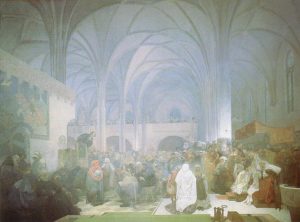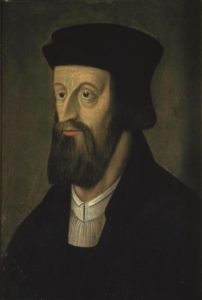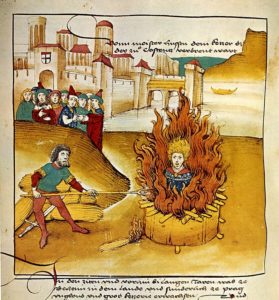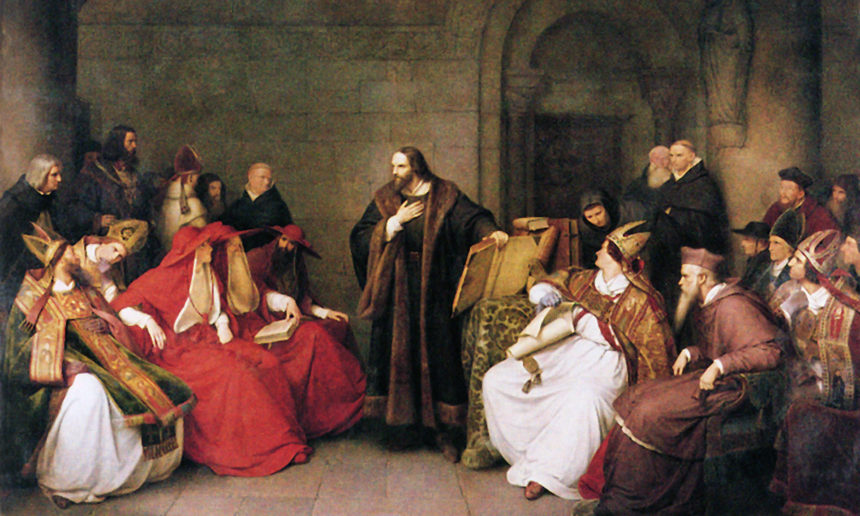Jan Hus the Early Reformer
Known as the greatest religious reformer of the 15th century, Jan Hus has a legacy that precedes the Protestant Reformation. Hus was a medieval pastor seeking to reform the church in his homeland. He is also known for his horrendous execution at the Council of Constance in 1415, burned at the stake for his teachings.
I was overwhelmed with astonishment, I could not understand for what cause they had burnt so great a man, who explained the Scriptures with so much gravity and skill.” – Martin Luther, 1520
Humble Beginnings
He was born circa 1370 to a humble family in the town of Husinec in Bohemia, southern Czech Republic today. Hus trained to be a priest in order to escape poverty. In 1393 earned his bachelor of arts at the university in Prague followed by his master of arts and doctorate.
 In 1401, he was ordained a priest and the Czech masters of Charles College chose him to be preacher at Prague’s Bethlehem Chapel. The church was one of the largest in Europe and held 3,000 attendees. It was a center of reform in Bohemia which included sermons given in Czech and not Latin.
In 1401, he was ordained a priest and the Czech masters of Charles College chose him to be preacher at Prague’s Bethlehem Chapel. The church was one of the largest in Europe and held 3,000 attendees. It was a center of reform in Bohemia which included sermons given in Czech and not Latin.
In the following years, he spent time with what he called a “foolish sect,” where he discovered the bible. He wrote, “When the Lord gave me knowledge of Scriptures, I discharged that kind of stupidity from my foolish mind.”
 It was during this time he became know for his impassioned sermons supporting reform, placing more emphasis on the bible, and stirring controversy by denouncing moral failures of clergy, bishops, papacy, and institutionalized religious practices of the day. Hus started trusting and relying on the scriptures more, “desiring to hold, believe, and assert whatever is contained in them as long as I have breath in me.”
It was during this time he became know for his impassioned sermons supporting reform, placing more emphasis on the bible, and stirring controversy by denouncing moral failures of clergy, bishops, papacy, and institutionalized religious practices of the day. Hus started trusting and relying on the scriptures more, “desiring to hold, believe, and assert whatever is contained in them as long as I have breath in me.”
Reform in the Midst of Turmoil
It was a time of European political upheaval complicated by rivaling popes vying to rule all of Christendom which was eventually settled in 1409. His teachings were akin to that of John Wycliffe, the fourteenth-century English reformer. Theological writings of Wycliffe had made their way to Prague during the 1390s. Bohemia was already known for their history of reformist attitudes and some of Wycliff’s theology was widely accepted including expanding the authority of church councils becoming independent of the Roman church and its papal control.
In 1409, Hus became rector at Prague and was elevated as head of the reform movement. With the Roman church’s authority being challenged, Pope Alexander V condemned Wycliff theology and burned all his works. Hus continued his reformist preaching and was soon excommunicated for his disobedience.
He voluntarily left Prague and took refuge in castles of friends in Bohemia where he composed a number of treatises including his famous treatise on Wycliff ecclesiology, De ecclesia, which was read publicly in Prague arguing that Christ alone is head of the church and an erring pope is to obey Christ. He also wrote a collection of sermons, Postilla.
In 1414, the Council of Constance was convened, and Hus attended but was immediately imprisoned and held for months. Instead of a hearing, he was taken before authorities where he refused to recant, and he was declared a heretic. Turned over to secular authorities, he was burned alive.
 He is said to have prayed, “Lord Jesus, it is for thee that I patiently endure this cruel death. I pray thee to have mercy on my enemies.” As the flames engulfed him, he was heard reciting the Psalms. After his execution, his ashes were tossed into a lake so that there were no remains of the heretic. But some Czechs collected bits of soil where he had died and brought them back to Bohemia as a memorial.
He is said to have prayed, “Lord Jesus, it is for thee that I patiently endure this cruel death. I pray thee to have mercy on my enemies.” As the flames engulfed him, he was heard reciting the Psalms. After his execution, his ashes were tossed into a lake so that there were no remains of the heretic. But some Czechs collected bits of soil where he had died and brought them back to Bohemia as a memorial.
His Legacy
Upon word of his death Bohemians were angered and repudiated the council. A coalition was formed and refused to submit to the authority of the Holy Roman emperor or the church and fought off five papal crusades between 1420 and 1431, known as the Hussite Wars. Later, Bohemia reconciled with the rest of Christendom on its own terms. From this came the Union of Brethern, or Unitas Fratrum which was influential in the conversion of the Wesley brothers and others.
Historically, Hus became a martyred reformer opposing the papacy and the institution of the Roman church. His work was influential in transitioning from medieval to Reformation periods. Hus became a hero to many reformers who came after his death including Martin Luther. Hus was admired for his preaching on Reformation themes a century before Luther wrote his famous 95 Theses.
Years after Hus’s death, in Leipzig, Luther was accused of supporting Hus’s claim that the Greek church was equal to the Roman church and that the Council of Constance erred in their execution of Hus. And that councils like popes and theologians could err and therefore be subordinate to scripture.
After reading Hus’s De ecclesia treatise, Luther declared that he, his prior Johannes von Staupitz, St. Augustine, and even St. Paul were “all Hussites.”
==> Learn about Dwight L. Moody.


